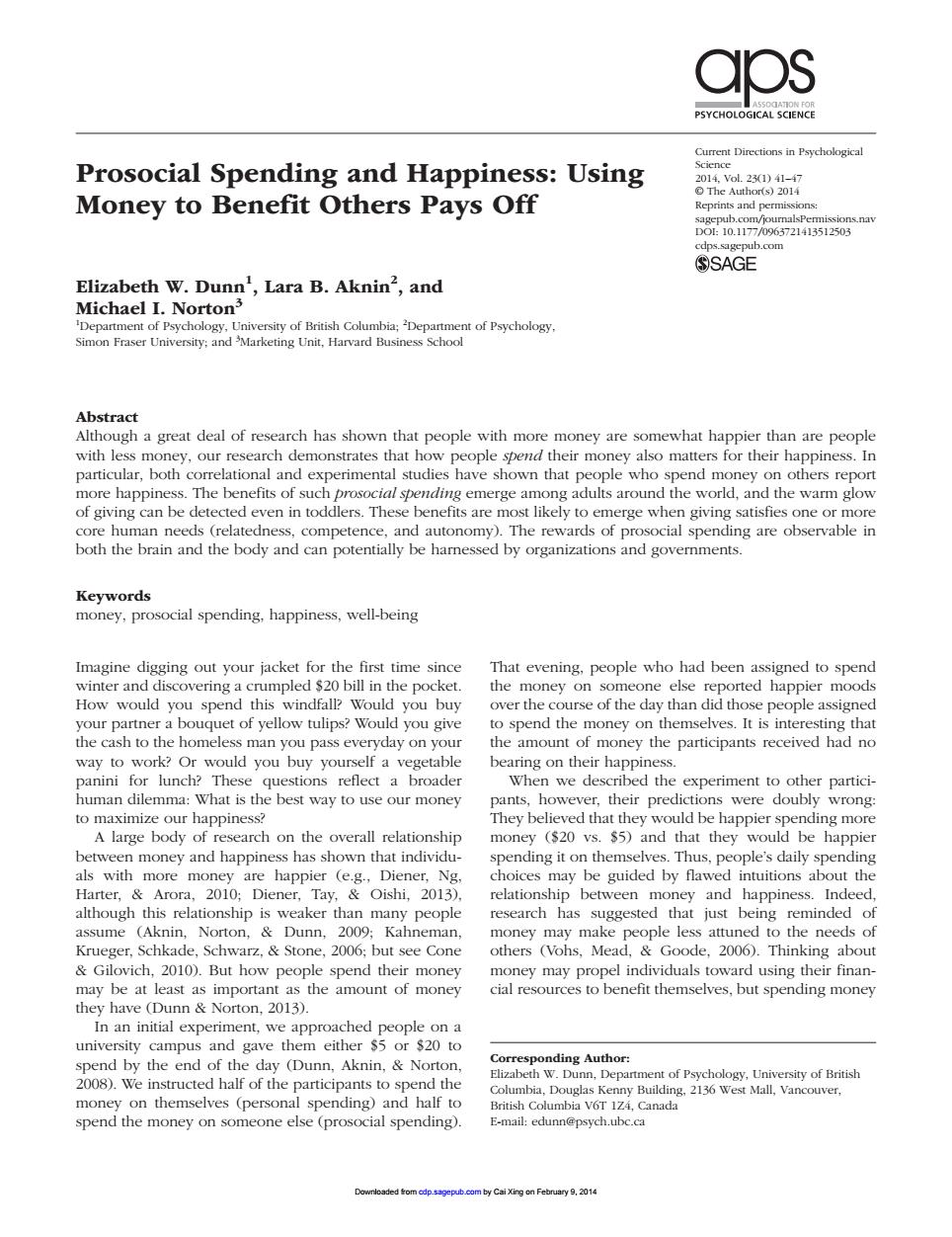正在加载图片...

aps nt Directions in Pychca Prosocial Spending and Happiness:Using Money to Benefit Others Pays Off ts and p SAGE Elizabeth W.Dunn',Lara B.Aknin2,and Michael I.Norton3 reat deal of research has shown that p ier thar with less mo ev.our research demonstrates that how people particular,both correlational and experimental studies have shown that people who spend money on others report more happiness.The benetits of suc of giving can b detected even in tod n tomlcly to merge when giving anone or mor Th social spending.happiness,well-being Imag out your iacket for the fre me sinc That ople who had been ed to spenc overing a crumpled $20 bill in the pocket. How would you spend this windfall?Would you buy d e man you pass everyday on your he an ed ng tha on th panini for lunch?These questions reflect a broader human dilemma:What is the best way to use our monev ons were doubly wrong to maximize our happiness A la ge on the overal aetpeningmoe nat they appie als with more mone are happier (e.g..Diener.No Harter,Arora,2010;Diener,Tay,Oishi,2013). relationship between money and happiness.Indeed research has suggested that just bei g reminde Gilovich,2010).But how people spend their money money may pel individuals toward using their finan may be at least as important as the amount of money cialresources to benefit themselves.but spending money they have (Dunn Norton,2013) 20 2008)We instructed half of the participants to spend the money e(prosocial spending) 9.2014 Current Directions in Psychological Science 2014, Vol. 23(1) 41–47 © The Author(s) 2014 Reprints and permissions: sagepub.com/journalsPermissions.nav DOI: 10.1177/0963721413512503 cdps.sagepub.com Imagine digging out your jacket for the first time since winter and discovering a crumpled $20 bill in the pocket. How would you spend this windfall? Would you buy your partner a bouquet of yellow tulips? Would you give the cash to the homeless man you pass everyday on your way to work? Or would you buy yourself a vegetable panini for lunch? These questions reflect a broader human dilemma: What is the best way to use our money to maximize our happiness? A large body of research on the overall relationship between money and happiness has shown that individuals with more money are happier (e.g., Diener, Ng, Harter, & Arora, 2010; Diener, Tay, & Oishi, 2013), although this relationship is weaker than many people assume (Aknin, Norton, & Dunn, 2009; Kahneman, Krueger, Schkade, Schwarz, & Stone, 2006; but see Cone & Gilovich, 2010). But how people spend their money may be at least as important as the amount of money they have (Dunn & Norton, 2013). In an initial experiment, we approached people on a university campus and gave them either $5 or $20 to spend by the end of the day (Dunn, Aknin, & Norton, 2008). We instructed half of the participants to spend the money on themselves (personal spending) and half to spend the money on someone else (prosocial spending). That evening, people who had been assigned to spend the money on someone else reported happier moods over the course of the day than did those people assigned to spend the money on themselves. It is interesting that the amount of money the participants received had no bearing on their happiness. When we described the experiment to other participants, however, their predictions were doubly wrong: They believed that they would be happier spending more money ($20 vs. $5) and that they would be happier spending it on themselves. Thus, people’s daily spending choices may be guided by flawed intuitions about the relationship between money and happiness. Indeed, research has suggested that just being reminded of money may make people less attuned to the needs of others (Vohs, Mead, & Goode, 2006). Thinking about money may propel individuals toward using their financial resources to benefit themselves, but spending money 512503 CDPXXX10.1177/0963721413512503Dunn et al.Prosocial Spending and Happiness research-article2014 Corresponding Author: Elizabeth W. Dunn, Department of Psychology, University of British Columbia, Douglas Kenny Building, 2136 West Mall, Vancouver, British Columbia V6T 1Z4, Canada E-mail: edunn@psych.ubc.ca Prosocial Spending and Happiness: Using Money to Benefit Others Pays Off Elizabeth W. Dunn1 , Lara B. Aknin2 , and Michael I. Norton3 1 Department of Psychology, University of British Columbia; 2 Department of Psychology, Simon Fraser University; and 3 Marketing Unit, Harvard Business School Abstract Although a great deal of research has shown that people with more money are somewhat happier than are people with less money, our research demonstrates that how people spend their money also matters for their happiness. In particular, both correlational and experimental studies have shown that people who spend money on others report more happiness. The benefits of such prosocial spending emerge among adults around the world, and the warm glow of giving can be detected even in toddlers. These benefits are most likely to emerge when giving satisfies one or more core human needs (relatedness, competence, and autonomy). The rewards of prosocial spending are observable in both the brain and the body and can potentially be harnessed by organizations and governments. Keywords money, prosocial spending, happiness, well-being Downloaded from cdp.sagepub.com by Cai Xing on February 9, 2014